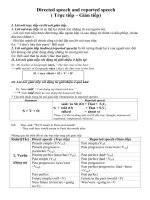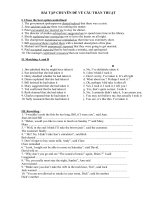chuyên đề về câu trực tiếp - Gián tiếp
Bạn đang xem bản rút gọn của tài liệu. Xem và tải ngay bản đầy đủ của tài liệu tại đây (167.51 KB, 8 trang )
Directed speech and reported speech
( Trực tiếp – Gián tiếp)
I. Lời nới trực tiếp và lời nói gián tiếp
1. Lời nói trực tiếp: là sự lặp lại chính xác những từ của người nói.
- Lời nói trực tiếp được đặt trong dấu ngoặc kép và sau động từ chính có dấu phẩy(,) hoặc
dấu hai chấm(:).
- Đôi khi mệnh đề chính cũng có thể đặt sau lời nói trực tiếp.
Ex: “ I don’t like this party” Bill said.
2. Lời nói gián tiếp (indirect/reported speech) là lời tường thuật lại ý của người nói, đôi khi
không cần phải dung đúng những từ của người nói.
Ex: Bill said that he didn’t like that party.
II. Lời nói gián tiếp với động từ giới thiệu ở hiện tại
Ex: My teacher of Geography says, “ The Sun rises in the East.”
My teacher of Geography says ( that ) the Sun rises in the East.
III. Lời nói gián tiếp với động từ giới thiệu ở quá khứ
Ex: Nam said, “ I am doing my homework now.”
Nam said (that) he was doing his homework then.
* Câu trần thuật trong lời nói gián tiếp ( Statements in reported speech)
Statement Reported speech
S + V + O
said / to Sb (O) + That + S
2
V
2
S
1
+ told (O) + That + S
2
V
2
talked + about st
*Note: Có thể sử dụng một số ĐT dẫn sau: thought, announced,
explained, complained, believed…
EX: They said, “We’ll return to Paris next month”
- They said they would return to Paris the month after.
Những quy tắc biến đổi từ câu trực tiếp sang câu gián tiếp
Rule(QTắc) Direct speech (Trực tiếp) Reported speech (Gián tiếp)
1. Verbs
(Động từ)
Present simple (V/V
s/es
) Past simple (V
ed
)
Present progressive
(is/am/are+V
ing
)
Past progressive (was/were+V
ing
)
Present perfect (have/has+V
pII
) Past perfect (had+V
PII
)
Past simple (V
ed
) Past perfect (had +V
pII
)
Past progressive (was/were
+V
ing
)
Past progressive/
Past perfect progressive (had +been
+V
ing
)
Past perfect Past perfect
Future simple (will +V) Future in the past (would +V)
Near future (is/am/are +going Was/were +going to +V
S1 + says (that) + S2 + V’ + O’
to+V)
2. Modal
verbs
Will
Can
May
Must
Would
Could
Might
Must/Had to
3. Adverb
of place
This That
These Those
Here There
4. Adverb
of time
Now Then
Today That day
Yesterday The day before/ the previous day
The day before yesterday Two days before
Tomorrow The day after/the next (following)day
The day after tomorrow Two days after/ in two days’ time
Ago Before
This week That week
Last week The week before/ the previous week
Last night The night before
Next week The week after/ the following week
5. Subject
/Object
I / me She, he /Her, him
We /our They/ us
You/you I, we/ me, us
*Câu mệnh lệnh, câu yêu cầu, câu đề nghị, lời khuyên….trong lời nói gián tiếp
( Orders, requests, offers, advice… in indirect speech)
Order Reported speech
V + O
Asked/told + Object (+ not) + To-infinitive
S
1
+ Offered/recommended (+ Object) + To-infinitive
*Note: Có thể sử dụng một số ĐT dẫn sau: commanded, requested,
begged, promised, advised, invited, reminded…
* Câu hỏi trong lời nói gián tiếp (Questions in reported speech)
Questions Reported speech
1. Yes/No questions
Auxiliary + S + V + O?
(Do/does/did/had/will)
S
1
+ asked (+ Object) + If/whether + S
2
V
2
2. Wh – questions
WH + Auxiliary + S + V + O? S
1
+ asked (+ Object) + WH + S
2
V
2
*Note: Có thể sử dụng một số ĐT dẫn sau: inquired, wondered,
wanted to know…
* Lưu ý, trong những trường hợp sau động từ không biến đổi
1. Lời nói trực tiếp diễn tả một sự thật hiển nhiên, một chân lí hay một thói quen ở hiện tại
EX: 1. My father said “New York is bigger than London”
- My father said that New York is bigger than London
2. The teacher said, “The moon moves around the earth”
- The teacher said that the moon moves around the earth.
3. He said, “ I always drink milk for breakfast”
- Peter said that he always drinks milk for breakfast.
2. Lời nói trực tiếp có các động từ tình thái như: could, would, should, might, ought to, used to, had better.
EX: My friend said, “You had better contact with her”
- My friend said that I had better contact with her.
3. Lời nói trực tiếp là câu điều kiện loại II hoặc câu điều kiện loại II.
He said, “ If I were you, I wouldn’t wait”
- He said that if he were me he wouldn’t wait.
4. Thời quá khứ đơn hoặc quá khứ tiếp diễn có thời gian các định hoặc thuộc mệnh đề chỉ thời gian.
1. She said, “My mother arrived on Monday”
- She said that her mother arrived on Monday.
2. He said, “When I saw them, they were playing tennis”
- He said when he saw them they were playing tennis.
I. Turn these sentences into Reported speech.
1. She said,” I can’t find my umbrella”
___________________________________________________________
2. They said, “We are learning English now”
___________________________________________________________
3. “ My friend is coming next week”, Tom said.
___________________________________________________________
4. “ I’ll help my mum with housework this weekend”
___________________________________________________________
2. “We shall overcome this difficulty”, they said
___________________________________________________________
3. “ My father is a doctor here”, my friend said
___________________________________________________________
4. “I am going on holiday tomorrow”, the boy said to his neighbor.
___________________________________________________________
5. “ You will have to finish all these exercises before next week”, the teacher said to his
students
___________________________________________________________
6. “ I came back here early yesterday,” she said.
___________________________________________________________
7. “ I’ve broken the vase,” she said
___________________________________________________________
8. “ I will never see you again,” the boy said to the girl.
___________________________________________________________
1. He said to her, “You are my friend.”
___________________________________________________________
2. Johnny said to his mother, “I don’t know how to do this axercise.”
___________________________________________________________
3. “We are waiting for the school bus”, said the chidren.
___________________________________________________________
4. Marry said, “My father died a year ago”.
___________________________________________________________
5. John said, “I have finished studying my lesson”.
___________________________________________________________
6. Mary said, “I can not go to the movies with you, John”.
___________________________________________________________
7. “I shall expect to see you next Wednesday.” Mary said to her friend.
___________________________________________________________
1. He said, “I don’t know what happened.”
________________________________________________
2. She said, “I went to the doctor yesterday.”
________________________________________________
3. He said, “I have a toothache.”
________________________________________________
4. She said, “I’ll write him a prescription.”
________________________________________________
5. They said, “We’re going to the drugstore.”
________________________________________________
6. He said, “The doctor gave me some pills.”
________________________________________________
7. She said, “I go to the supermarket every day.”
________________________________________________
8. He said, “I have received the envelope.”
________________________________________________
9. They said, “We visited Cannery Row.”
________________________________________________
10. She said, “I feel very sick.”
________________________________________________
11. He said, “I bought some popcorn.”
________________________________________________
12. They said, “We’re flying to California.”
________________________________________________
13. He said, “I’m cutting off the main valve.”
________________________________________________
1. Nam said, “my uncle often plants the vegetables in the afternoon.”
……………………………………………………………………... …
2. “My uncle will not plant the vegetables tomorrow afternoon”, she said.
……………………………………………………………………………….
3. “Mr and Mrs Pike have just read these newspapers”, Nga said.
……………………………………………………………………………
4. She said, “I often listen to music at night.”
………………………………………………………
5. Lan’s mother said, “ My daughter usually brushes her teeth before meals.”
…………………………………………………………………………………
6. They said, “We have to do the assignments now.”
…………………………………………………………….
7. Lan says, “My sister seldom rides a bike to school.”
………………………………………………………...
8. They said, “Our teacher sometimes explains the difficult lesson.”
………………………………………………………………………….
9. Nam said, “ I am doing my homework now.”
…………………………………………………………
II. Change the sentences below into direct speech.
1. My mother told me that she was sad then.
___________________________________________________________
2. One of my friends said that she liked learning English with her teacher.
___________________________________________________________
3. The doctor told me that I could leave the hospital that day.
___________________________________________________________
4. The film director said that she was willing to work then.
___________________________________________________________
5. The teacher told his students that he would be busy the following month.
___________________________________________________________
6. Tom invited me to his birthday party.
___________________________________________________________
7. She said the doctor had written her a prescription.
________________________________________________
8. He said that he had a toothache.
________________________________________________
9. She said she went to the museum every day.
________________________________________________
10. They said they were going to the supermarket.
________________________________________________
11. She said that the doctor had given her some pills.
________________________________________________
12. He said he had received the report.
________________________________________________
III Change the following sentences into reported speech:
1. She said to him: “give me another glass of wine”.
………………………………………………………..
……………………………………………………………………………………………
2. She said to me: “bring me a book”.
………………………………………………………..
……………………………………………………………………………………………
3. Mother said to him: “open the window please!”.
………………………………………………………..
……………………………………………………………………………………………
4. He said to me: “shut the door after you”.
………………………………………………………..
……………………………………………………………………………………………
5. The captain said to them: “wait here still I come back”.
………………………………………………………..
……………………………………………………………………………………………
6. She told her: “take it and come with me”.
………………………………………………………..
……………………………………………………………………………………………
7. He said to me: “don’t come back before one o’clock”.
………………………………………………………..
……………………………………………………………………………………………
8. My mother told me: “don’t forget to look at the door”.
………………………………………………………..
……………………………………………………………………………………………
9. He said to his brother: “don’t open the window, open the door”.
………………………………………………………..
……………………………………………………………………………………………
10. He said to the girl: “don’t sit on my bed, sit on this chair please!”.
………………………………………………………..
……………………………………………………………………………………………
11. The teacher said: “I am a teacher”.
………………………………………………………..
……………………………………………………………………………………………
12. She said to me “I have a big house”
………………………………………………………..
……………………………………………………………………………………………






